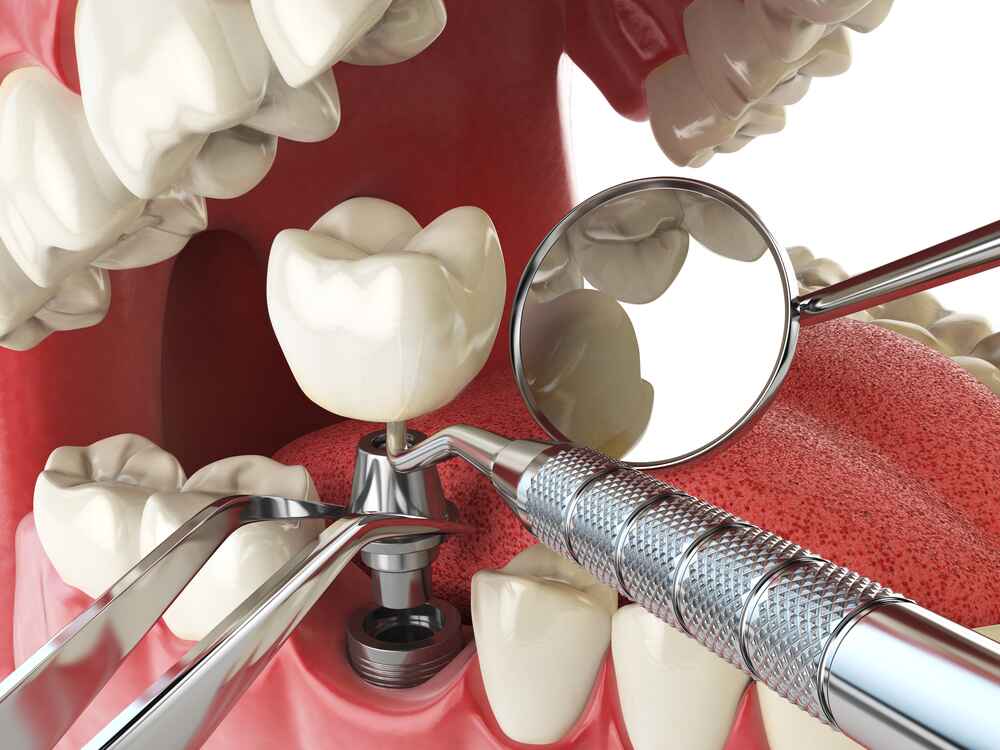Are you looking for the best Dental Implants in Mississauga ? Then you are at the right place Queensway Dental can help you to bring a bright smile to your face and is the best alternative to bridgework or dentures and retain a longer natural-looking appearance. Dental Implants is a procedure in which missing or damaged teeth roots are replaced with artificial teeth which look identical to the real teeth. This is done through the usage of a metal connector which holds the position of the teeth and fills in the gap. The ideal candidates for dental implants should have good overall and oral health. For dental implants, patients must have a fully developed jawbone with sufficient density or be eligible for a bone graft and also they should have healthy gum tissue. Being a non-smoker and willing to commit to the process for several months are also essential factors.
For the best result of Dental Implants Mississauga consult us.
Benefits of Dental Implants Mississauga
Dental implants have many benefits, for instance: –
Improve ability to talk and chew. Dentures can move, causing chewing issues.
Dental implants are permanent like natural teeth for confident, pain-free eating.
Loose dentures may affect speech. With implants, you can speak without discomfort.
Comfort: Your dentures may no longer fit well over time due to changes in the shape of your gums. Dentists recommend realigning dentures regularly and replacing them every 5-8 years. Implants can offer more comfort and stability as they fuse with your jaw.
Enhance oral health: Poorly fitting dentures can cause gum soreness or infection due to trapped bacteria. Implants provide better access for flossing and do not require altering nearby teeth like bridges.
Enhance appearance: The dental crown is designed to match the appearance of your natural teeth. It helps to restore your smile and boost your self-confidence.
Prevention of bone loss: The roots of your natural teeth help to stabilize your jawbone. If you have teeth removed without replacing them, it can lead to a deterioration of your jawbone, which can alter the structure of your mouth and face. Dental implants can function just like natural teeth, as they anchor into the jaw to maintain bone density and prevent loss over time.
Types of Dental Implants
There are mainly two types of dental implants and there are others too such as trans steal and zygomatic implants, but these are a little bit complex and not so common to use.
Endosteal Implants
Endosteal means “inside the bone” and is the most common implant suggested by the dentist. In this procedure, usage of blades, cylinders, or screws is done to fasten the tooth into the jawbone. the screw is made up of titanium material.
The surgery takes place by making an incision into the jaw, drilling into the bone, and then, inserting the implants which act as an artificial tooth root. An abutment is placed into this body to secure the place of an artificial tooth, also called a crown. An endosteal implant can hold two or more dental prosthetics.
Subperiosteal Implants
Subperiosteal Dental implants take place “on the bone” and are recommended only when an endosteal implant can’t be done due to an unhealthy jawbone. Unlike endosteal, these implants are placed above the bone and beneath the gum tissue.
Although custom subperiosteal implants can be designed considering the patient’s health. However, it is mostly made of cobalt, chrome, and molybdenum or surgical Vitallium. The model is generated through a CT scan which helps to design the implant.
Risks
Although implants do not cause major problems, however, it may possess some minor issues which are treatable easily such as:
- Infection at the implant
- Injury or damage to the surrounding teeth or blood vessels.
- Nerve damage cause the feeling of numbness, and pain in your original teeth, gum, chin, or lips.
- sinus cavities could occur due to the placement of implants in the jaw.
After the procedure
Whenever you have gone through the surgery, you may face certain issues or discomfort due to the surgery, which are as follows:
- Swelling over the face or gum
- Skin and Gum bruising
- Pain at the Implant
- Minor bleeding
In most cases, the surgeon uses dissolved stitches, otherwise, if these are undissolved stitches, they can be removed by the surgeon. Also, it is recommended to eat soft food after the surgery. If you consistently feel pain at your implant site, then you can need medications or antibiotics from your dentist or contact Dental Implants Mississauga.
For further information regarding Dental Implant Mississauga, contact us at Queensway Dental Mississauga or on our number 9058960620.

